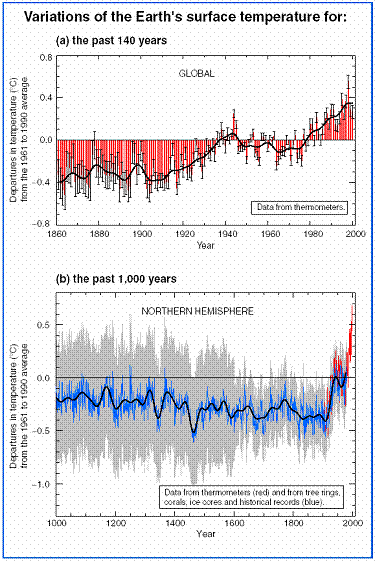

Início
Climate Change and Governance Conference, 28-29 March 2006, New Zealand
por Betsan MARTIN
Temas fortes ligados:
Meio ambiente e responsabilidade .
Temas largos ligados:
Mudança climática .
The conference on Climate Change focused on scientific evidence and integration of the projections for climate change with social and economic policy and governance.
 The scientific presentations were brilliant, inscribing in our minds the graphic picture of fluctuations in Earth’s temperature over millions and hundreds of years, and the surge in the last 100.
The scientific presentations were brilliant, inscribing in our minds the graphic picture of fluctuations in Earth’s temperature over millions and hundreds of years, and the surge in the last 100.
The conference brought forward the marvel of the complexity and integration of earth’s ecosystems and relationship between land, water and atmosphere. Seeing this graph on the variations of the Earth’s surface temperature, and the disaster it spells for life on earth caused me to reflect again on the fallacy of knowledge and research that is driven by rationality, or logos, separated from wisdom, emotion, intuition. Reason split from relationality.
A message of Climate Change is that the trajectory of warming indicates that it will not be possible to sustain life on earth as we know it. One of the reminders from the Climate Change conference is that earth is a system; perhaps capable of moving to a new state. Dare we allow this, what will be the legacy, can it be reversed and if so, do we have the collective will to do so? Along with local and national responsibilities, multilateral co-operation is imperative. One scientist proposed that we work globally with the atmosphere as a global commons.
The carbon tax that was proposed in New Zealand as part of our Kyoto commitments has been abolished. The Minister at the conference said, ‘we didn’t have the votes to pass it’. Since we are at the mercy of democratic process we have responsibility to disseminate information on Climate Change with strategies for intervention.
One of the serious concerns from this conference is the emphasis on adaptation. Rather than remedy – remedy of our systems, policies and energy use. Change is inevitable, and will require adaptation. But adaptation and technological invention remaining tied to ‘growth’ to allow human, plant and biological life to survive the warming process and the massive disturbance of earth as we know her, can blur our obligation to respond.
The implications for transport, industry, fuel, production are huge. The paradigms and values of progress and growth are deeply embedded in future oriented thinking. There was critique of utilitarian economic theory, and presentations on sustainability and more wholistic approaches to human behaviour. Some say that poverty is a more pressing to solve. The challenge of energy transformation needed at personal and public policy levels was raised. I am reminded of the philosophical quest to heal the split between nature and culture, and of the contribution to this from indigenous traditions.
Climate change and the Charter of human responsibilities’ process
As far as our initiatives on Responsibility are concerned, I would say that information material is imperative. As Cecile Sabourin (Coordinator of the Regional Committee for Canada) says, there is already a lot of information available, and it may be a matter of working with what has been done. Sometimes new material reaches new audiences; for instance, the Greens here in New Zealand have put out a new document to coincide with the conference and it has received unprecedented public interest (see article Turn Down the Heat). Producing a booklet is partly a matter of resources and of priorities, and it sounds as though it is part of a strategy for Responsible initiative for Climate Change.
We can imagine a climate change series of handbooks produced to reflect both global issues and information specific to our regions. With the Human Rights Commission we have just agreed to run a public seminar series on Rights and Responsibilities in the context of Climate Change. It will be in the second part of the year.


